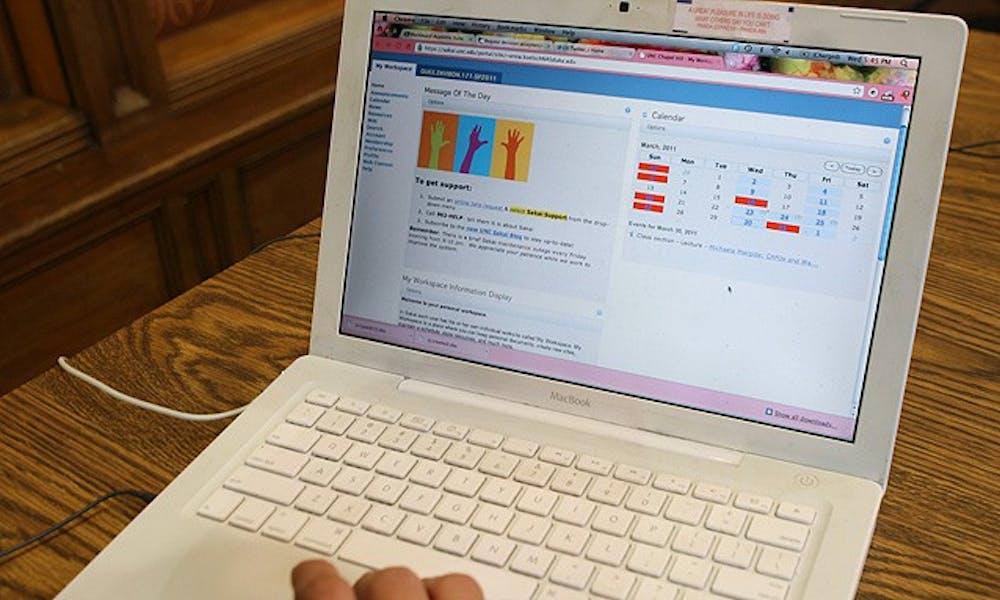Three years after implementing the most recent version of the Blackboard Academic Suite, Duke will upgrade its software.
A mid-term survey of participants using using a new piece of software, Sakai Collaboration and Learning Environment, in place of Blackboard has yielded “generally positive” feedback, wrote Lynne O’Brien, director of academic technology and instruction services for Perkins Library, in a March 29 email. She added that the instructors will be asked to evaluate their experience with Sakai at the end of the semester.
“As we continue to gather information from faculty and students, we will be modifying our version of Sakai and integrating it with other tools to provide the best possible support for teaching and learning at Duke,” O’Brien wrote.
At the beginning of the semester, 11 Spring 2011 courses began using Sakai as part of a pilot program, which aims to gauge student and professor satisfaction with the software. At the end of the semester, the instructors of these classes and their roughly 400 total students will provide feedback about Sakai, which the University hopes to have all classes using by July 2012.
Although only 93 students responded to the recent survey, 41 of them reported their experience has been “good,” while 12 described it as “excellent.” Only 6 students reported their experience as “fair” and 18 as “poor,” but because 8 of the students who reported bad experiences are in one class, O’Brien believes their problems may be linked to a specific issue in that course.
The main advantage Sakai has over Blackboard is that it is an open-source program, O’Brien wrote. Using open-source software means that rather than paying a licensing fee to a company in return for a product, the University will receive the program’s original source code—which can then be altered to meet the University’s needs.
Keith Wilhite, a lecturing fellow in the Thompson Writing Program whose Writing 20 class is participating in the pilot program, wrote in a March 29 email that he uses Sakai extensively for his course and has had a positive experience with it so far.
“Sakai seems more flexible than Blackboard as a full course management site and organization platform,” he said. “More importantly, from my perspective, my students seem to find the interface more user-friendly.”
Isalyn Connell, a freshman in Wilhite’s class, also praised the interface, adding that it is also more aesthetically pleasing than Blackboard’s. Her favorite Sakai feature is the syllabus function, which allows the instructor to post an online syllabus and attach links to downloadable readings and class assignments within it.
“The syllabus function on Sakai is a lot better than anything Blackboard has to offer,” Connell wrote in a March 28 email. “It is a lot easier to find things and know exactly what is due when.”
Connell said she also enjoyed Sakai’s calendar function, which combines the syllabi from all of a student’s classes into a single calendar.
Owen Astrachan, a professor of the practice in the computer science department whose CompSci 6 class is participating in the pilot, had a more difficult time with Sakai. Because the pilot Sakai program is hosted at the University of North Carolina, participating Duke students need to use special login names to access Sakai instead of their NetIDs and passwords. This made username and password recovery a complex process if a student’s login was lost, prompting Astrachan to switch back to Blackboard early in the semester.
“If I was going to have that complex process for even five people, that was going to be more of a headache that it’s worth,” he said.
Astrachan emphasized that his return to Blackboard had nothing to do with the functionality of Sakai, which he said worked fine. He added that he looks forward to using it in the Fall when it is integrated with Duke’s systems, though he said he believes some instructors will have an easier time than others switching to Sakai.
This article has been corrected to reflect the fact that Duke has used Blackboard for more than three years. The Chronicle regrets the error.
Get The Chronicle straight to your inbox
Sign up for our weekly newsletter. Cancel at any time.

